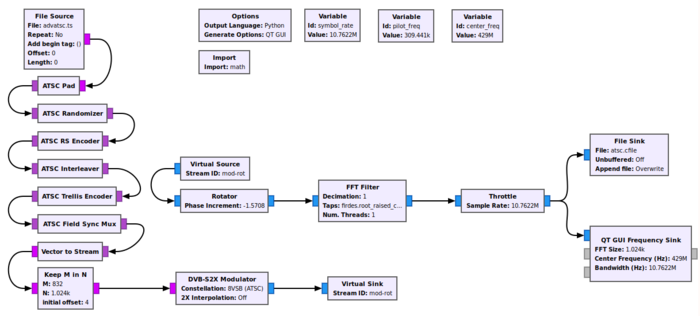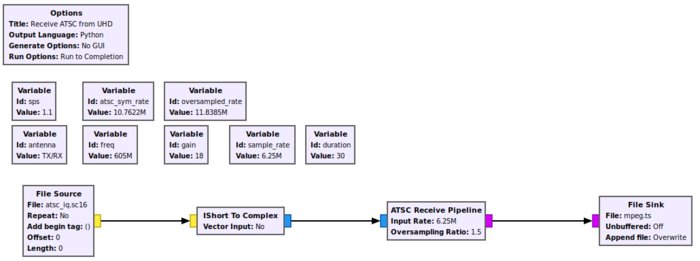ATSC: Difference between revisions
No edit summary |
No edit summary |
||
| Line 10: | Line 10: | ||
On the transmit side, none of the blocks have any parameters. | On the transmit side, none of the blocks have any parameters. | ||
== Example Flowgraph == | == Example Flowgraph == | ||
Revision as of 03:20, 27 July 2019
This page represents the documentation for all of the ATSC blocks, simply because they are intended to be used together, and most of the blocks have no parameters.
GNU Radio's ATSC (Advanced Television Systems Committee) module contains everything needed to transmit or a receive an ATSC signal. ATSC uses "8VSB" meaning 8-level vestigial sideband modulation. Each symbol includes two bits from the MPEG transport stream, which are then trellis modulated to produce a third bit. The 6 MHz channel used for broadcast ATSC carries a symbol rate of 10.76 megabaud, a gross bit rate of 32 Mbit/s, and a net bit rate of 19.39 Mbit/s of usable data.
Note that on the receive side, ATSC Receive Pipeline is a hier block defined here.
Parameters
On the receive side, the only real parameter is the oversampling ratio, a.k.a. the samples per symbol. The default is 1.5 but people have used 1.1 as well (someone please explain this).
On the transmit side, none of the blocks have any parameters.
Example Flowgraph
This is the example ATSC transmitter which can be found here. You can transmit this signal by removing the Throttle block and adding an SDR sink to the output of the FFT filter.
This is the example ATSC receiver which can be found here. Feel free to change the File Source type to complex (and remove the converter block) if that's the format of your IQ data. You can also replace the File Source and converter with an SDR source block.

